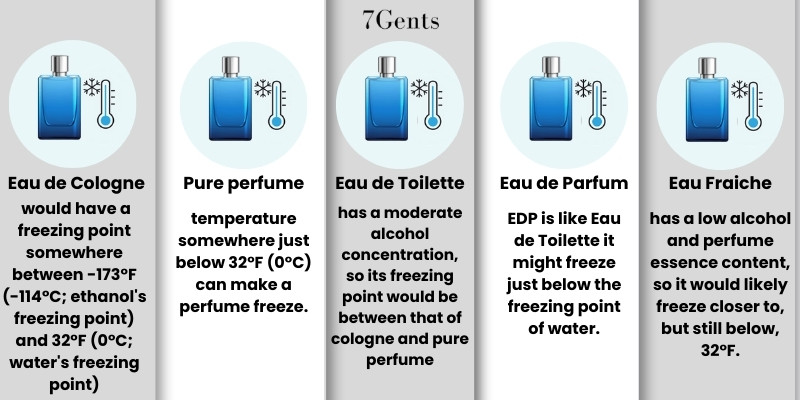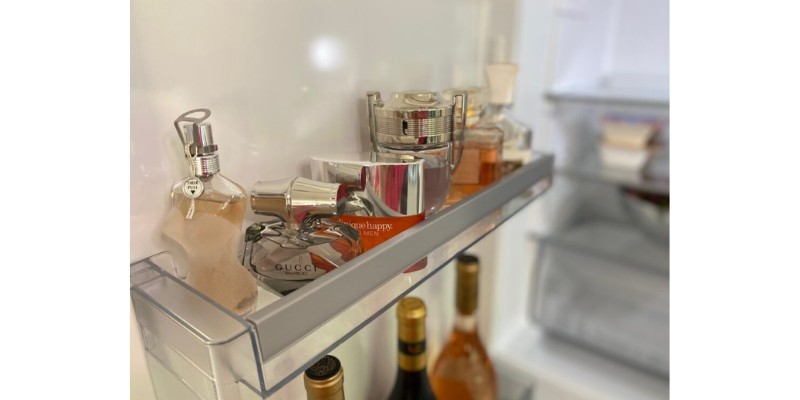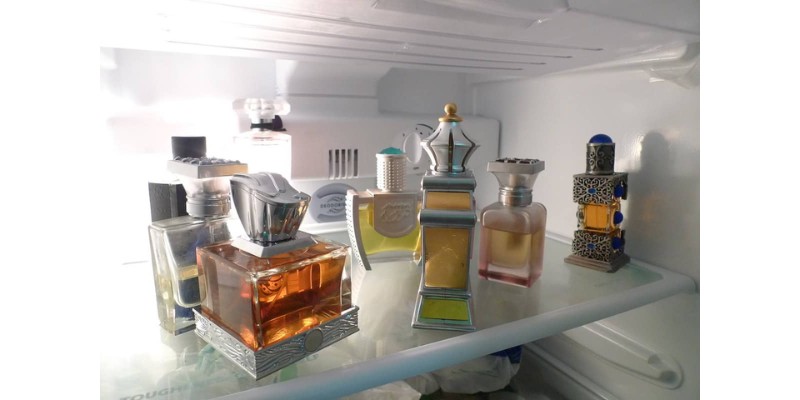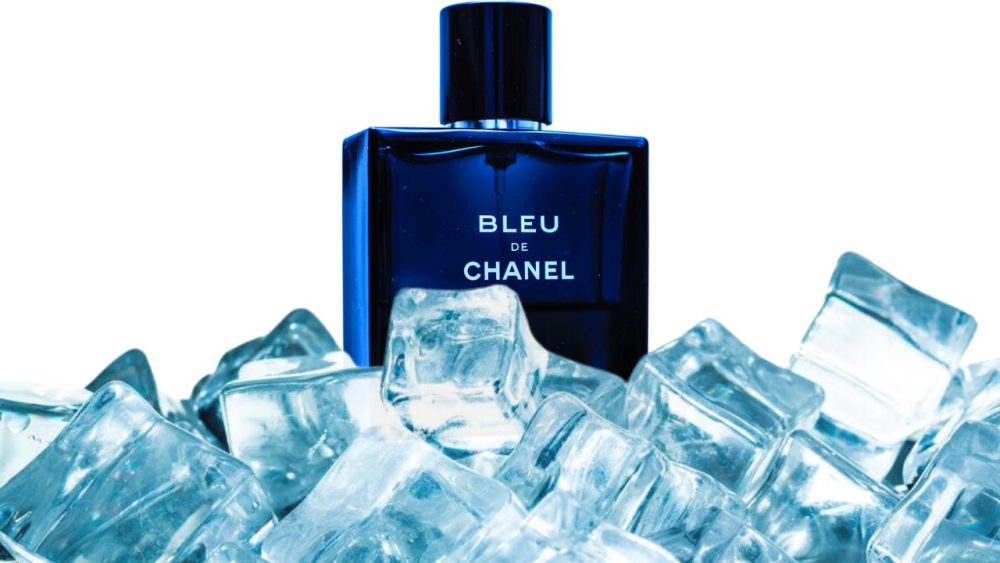 Key Takeaways
Key Takeaways
- Cologne freezing: Most colognes won’t freeze in typical cold conditions because of their high alcohol content. However, oil or water-based colognes can freeze under certain conditions.
- Cologne storage: Cold can affect the scent and viscosity of colognes, so it’s best to store them in a stable and moderate temperature. Avoid direct sunlight, heat, and air exposure.
- Cologne transportation: Altitude and pressure changes can cause cologne leaks or bottle breakage. Keep your cologne in your carry-on luggage or use travel-sized containers.
- Cologne preservation: Fridge storage can help preserve cologne in warm or humid areas, but only if it’s away from food items and temperature fluctuations. Freezer storage can damage cologne by altering its molecular structure.
So, can cold weather ruin perfume or cologne?
Most perfumes and colognes, which are typically 80 to 90% alcohol by volume (ABV), won’t freeze in typical cold conditions (-32°C or 0°F).
However, oil or water-based colognes can freeze under certain conditions. In other words, the ethanol in colognes is what generally prevents them from turning into an icy block in the cold.
But there’s more to this chilly tale. Dive in as we unravel the science behind colognes and their relationship with plummeting temperatures.
Cologne Freezing And Temperatures
Ever paused to think, “Does cold temperature ruin cologne?” Well, you’re not alone. I’ve delved deep into the chemistry of fragrances and how temperatures, especially the cold, play a role. Let’s break it down.
Colognes are mainly a blend of alcohol and oils. The alcohol, usually ethanol, acts as a solvent, ensuring the oils are evenly distributed, and giving you a consistent scent on every spray.
Now, here’s the fascinating bit: ethanol’s freezing point is a bone-chilling -173°F (-114°C). So, when we talk about most colognes, which can contain around 80 to 90% alcohol, they’re pretty resistant to freezing in your typical winter scenarios.
But, not all colognes are created equal. Some are oil or water-based, and these liquids are more vulnerable to the cold. In other words, freezing temperatures can vary.
But even then, it’s not just about the freezing temperature; it’s about the integrity of the scent. Cold can change the molecular structure of the essential oils and potentially alter the scent.
Another factor to consider is the concentration. Eau de Toilette, Eau de Parfum, and perfume have varying amounts of alcohol and oils.
The higher the oil content, the more likely it is to be affected by cold temperatures. So, although your favorite cologne might bravely withstand the winter chill, it’s always best to store it in a stable environment. Not too hot, not too cold – just right.
Fragrance freezing points
Now that I’ve answered the question, “Is it bad to leave cologne in the cold?” Let’s talk about actual freezing temperatures.

Different types of fragrance will have different chemical compositions, which means they’ll each have a slightly different freezing point.
So, the temperature at which you’d see perfume freeze is not necessarily the one you’d see cologne freeze at.
Here are estimations of the freezing temperatures of the various types of colognes. I say estimations as manufacturers have different ratios of perfume oil to alcohol, so none of this is absolute:
Eau de Cologne (EDC)
Generally, Eau de Cologne would have a freezing point somewhere between -173°F (-114°C; ethanol’s freezing point) and 32°F (0°C; water’s freezing point).
Since it has a higher alcohol content, its freezing point is lower than water but higher than pure ethanol.
Pure perfume
Perfume freezes close to the freezing point of water due to a higher concentration of perfume oil and lower alcohol content.
So a temperature somewhere just below 32°F (0°C) can make a perfume freeze. Naturally, this would be different for high alcohol-based perfumes.
Eau de Toilette (EDT)
EDT has a moderate alcohol concentration, so its freezing point would be between that of cologne and pure perfume.
Eau de Parfum (EDP)
EDP is like Eau de Toilette, but with a slightly higher concentration of essential oils, it might freeze just below the freezing point of water.
Eau Fraiche
Eau Fraiche has a low alcohol and perfume essence content, so it would likely freeze closer to, but still below, 32°F.
Can you put cologne in the fridge?
There’s that age-old question again: to chill or not to chill your cologne?
Putting cologne or perfume in the fridge can be a good idea but only under certain conditions. The cool, stable environment of a refrigerator can help preserve the integrity of the fragrance, especially if you live in a very warm or humid area.

The enemies of cologne are heat, light, and air. A fridge provides a dark, cool escape from these elements.
But, be cautious! Ensure your cologne is kept away from food items to prevent any scent contamination.
Also, if your fridge is packed and often opened, the constant change in temperature might do more harm than good. In short, you want to store perfume or cologne in an environment that’s stable and consistent.
Can you put cologne in the freezer?
Most colognes have a high alcohol content, and alcohol has a much lower freezing point than water.
So, while your fragrance might not turn into an ice block, the extreme cold can ruin perfume by upsetting the delicate balance of essential oils and other ingredients.

If you store perfume in the freezer, this can alter the scent profile of your cologne. Also, the rapid cooling and eventual thawing can cause the fragrance molecules to break down faster.
Can you leave cologne in a cold car?
We’ve all done it – left something in the car and then wondered if it’s still okay. With colognes, the stakes are a bit higher. So will cologne freeze in the car?
No, most colognes won’t freeze in a cold car overnight because of their alcohol content.
However, if the car warms up rapidly the next day, this sudden temperature shift can negatively affect perfume.
Cold can also affect the viscosity (adhesiveness) of the cologne, making it thicker and potentially altering how it sprays. And if your cologne is more water or oil-based, there’s a higher risk of freezing.
Try to avoid leaving your cologne in the car, especially during winter. I know some people like leaving a perfume bottle inside their car for emergencies, especially if you’ve got a good cold-weather cologne, but my advice would be to invest in a small fragrance decanter to serve that purpose rather than risking an entire bottle.
Effects of altitude on cologne storage
Altitude can significantly impact cologne storage. At higher elevations, reduced atmospheric pressure can affect the bottle’s internal pressure, potentially leading to leaks. Also, the rapid change in altitude, as experienced during air travel, can cause the liquid to expand, risking bottle breakage.
Additionally, the dry air common at high altitudes can accelerate cologne evaporation, altering the fragrance’s concentration and scent profile.
How To Prevent Your Cologne From Freezing
Keeping your cologne safe from freezing cold weather is important for it to maintain its romantic allure. Here are some quick tips to ensure your fragrance remains in tip-top shape:
Store in a stable environment
- Avoid areas with frequent temperature fluctuations.
- Store cologne at temperatures of between 60°F to 70°F (15°C to 21°C).
- Keep away from direct sunlight, which can heat the bottle and degrade the scent. Opt for a dark place instead. Also, the sun’s UV rays can penetrate a perfume bottle.
Mind the bottle
- Store cologne bottles in padded areas or wrapped in cloth for added protection. Cologne glass bottles can crack in extreme temperatures.
- Avoid placing colognes in areas prone to sudden temperature changes, like near heaters or air vents.
Travel smart
- If you’re flying somewhere, keep your cologne in your carry-on. The cabin is temperature-controlled and pressurized, unlike the cargo area.
- Consider using travel-sized plastic containers for short trips.
Original packaging
- Keep the original box. With most perfumes, it offers an extra layer of protection against cold weather and light.
- The box also provides insulation, helping maintain a stable temperature.
FAQs
How does freezing affect the scent of a cologne?
Freezing can change the molecular structure of perfume oil, potentially changing the fragrance’s profile and longevity.
Does the type of alcohol in cologne affect its freezing point?
Yes, different alcohols have varying freezing points. Ethanol, which is most commonly used in colognes, freezes at -173°F (-114°C).
How can I tell if my cologne has been damaged by cold weather?
Signs include scent alteration, change in liquid consistency, or separation of ingredients, the latter of which can often be seen through the bottle.
If my cologne does freeze, will it return to its original state once thawed?
Technically speaking, for the most part, yes but this is not guaranteed. Prolonged freezing can alter the scent or cause ingredient separation.
Related posts:



Write a comment